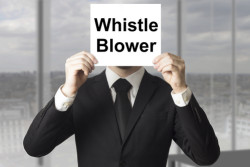Top Class Actions’s website and social media posts use affiliate links. If you make a purchase using such links, we may receive a commission, but it will not result in any additional charges to you. Please review our Affiliate Link Disclosure for more information.

The False Claims Act protects employees who report fraudulent activities performed by their employers against the United States government. Employees who “blow the whistle” on their employers are protected by the qui tam provision of the False Claims Act. However, this provision includes many requirements, which may be complicated and difficult to understand.
Employees who wish to blow the whistle on their employers may find that hiring an experienced attorney is an essential step in determining which course of action to take.
Filing a Whistleblower Lawsuit
Anyone who has evidence of fraud committed against federal programs or the federal government may be eligible file a qui tam or whistleblower lawsuit, according to the National Whistleblowers Center. However, in order to file this kind of lawsuit, you must be the first person to do so. If another individual or entity has already filed a lawsuit under the False Claims Act based on the same evidence as you, you will be unable to file a suit.
Additionally, in order to be eligible to receive a percentage of any recovered damages, it is not enough to merely report the fraud to the government through a whistleblower hotline or other avenue. Employees must file a qui tam lawsuit in order to qualify for a portion of any future settlement, according to Wikipedia.
Violators of the False Claims Act are liable for penalties of up to three times the dollar amount that they defrauded the government for, in addition to civil penalties of between $5,000 and $10,000 for each violation. Plaintiffs in qui tam lawsuits are generally eligible to receive a percentage of the total amount recovered by a lawsuit, usually between 15 to 30 percent.
As an employee who has witnessed Medicare fraud or Medicaid fraud against the government, should you call the government fraud hotline or call a lawyer?
While both options may seem to protect you from a retaliation claim, the two approaches are vastly different. As a whistleblower, it is important to be aware of the potential outcome of your choice.
Reporting Government Fraud to a Hotline
A number of agencies operate hotlines for whistleblowers to report Medicare fraud, Medicaid fraud and other types of fraud against the government.
Information on contacting various government agency hotlines to report fraud is readily available on an internet search when researching how to report fraud against the government.
These hotlines may be specific to the type of fraud being reported, such as reporting Medicare or Medicaid fraud.
Other agencies such as the OIG Hotline (Office of the Inspector General) will take reports on a number of different government agencies who were the target of fraud.
Both the Internal Revenue Service and U.S. Securities and Exchange Commission (SEC) have fraud hotlines, as do various state agencies.
Whistleblowers are often told that they may earn compensation for their role in exposing fraud against the government. However, the agencies associated with the various hotlines only offer up to $1000 to the whistleblower, and only do so if certain claims are met.
Retaliation against a whistleblower is prohibited when individuals call through a whistleblower hotline under the protection of federal law.
However, retaliation sometimes still does happen and when it does, a whistleblower must file a False Claims Act lawsuit. Individuals filing a False Claims Act lawsuit must be represented by an attorney.
If an individual reported fraud against the government to a hotline initially rather than hired a lawyer, the situation becomes complicated. Depending on the situation, a lawyer may not be able to help those who first reported through a hotline.
This may be true, even if the individual has a legitimate retaliation claim, according to Brian Mahany, a whistleblower attorney.
Hiring a Whistleblower Attorney to Report Fraud against the Government
Individuals may shy away from hiring an attorney to assist with a whistleblower report. Some may think reporting to the government agencies directly means they are doing the right thing. Others worry about the expense involved.
First of all, it is perfectly acceptable to hire an attorney to help you with a whistleblower case, and in fact, a reputable, experienced whistleblower attorney will tell you it is the only way to proceed.
It is important to ensure the lawyer you hire is an expert at helping clients with whistleblower lawsuits that target fraud against the government. Some attorneys will gladly take on a whistleblower case, but they may not understand the intricacies of the process the way a specialized attorney would.
Secondly, most specialized whistleblower attorneys will take on the cases on a contingency basis and will only take payment if the plaintiff gets an award, so there is no money required up front for quality legal representation.
Additionally, the protections for retaliation against whistleblowers who file a False Claims lawsuit are greater than for those who call a hotline.
Any additional legal action that needs to be taken against the employer for such retaliation can be handled by the whistleblower attorney familiar with the case who represented the whistleblower in the False Claims Act lawsuit.
Hiring an Attorney Can Bring You a Substantial Reward
Under the FCA, whistleblowers may earn between 15 and 30 percent of the total amount recovered by the government in a False Claims Act lawsuit.
Most False Claims Act lawsuits involve amounts in question of more than a million dollars. Even at the lower end, for whistleblowers filing a lawsuit where $1 million is in question, $150,000 would be the payout for the individual bringing the claim.
Bottom Line: Contact a Whistleblower Attorney First
Whistleblower provisions under the False Claims Act are complex and a lawyer can best help sort through the complexity of the situation.
An experienced whistleblower attorney can review your case confidentially and at no charge to you to discuss your claim involving fraud against the government and can guide you in your legal actions.
In general, whistleblower and qui tam lawsuits are filed individually by each plaintiff and are not class actions. Whistleblowers can only join this investigation if they are reporting fraud against the government, meaning that the government must be the victim, and that the alleged fraud should be a substantial loss of money.
Do YOU have a legal claim? Fill out the form on this page now for a free, immediate, and confidential case evaluation. The attorneys who work with Top Class Actions will contact you if you qualify to let you know if an individual qui tam lawsuit or whistleblower class action lawsuit is best for you. Hurry — statutes of limitations may apply.
ATTORNEY ADVERTISING
Top Class Actions is a Proud Member of the American Bar Association
LEGAL INFORMATION IS NOT LEGAL ADVICE
Top Class Actions Legal Statement
©2008 – 2024 Top Class Actions® LLC
Various Trademarks held by their respective owners
This website is not intended for viewing or usage by European Union citizens.
Get Help – It’s Free
Join a Free Whistleblower, Qui Tam Lawsuit Investigation
If you believe that you have witnessed fraud committed against the government, you may have a legal claim. Whistleblowers can only join this investigation if they are reporting fraud against the government, meaning that the government must be the victim, and that the alleged fraud should be a substantial loss of money.
See if you qualify to pursue compensation and join a whistleblower lawsuit investigation by submitting your information for a free case evaluation.
An attorney will contact you if you qualify to discuss the details of your potential case.
Oops! We could not locate your form.












